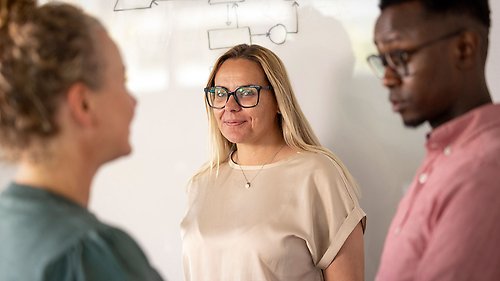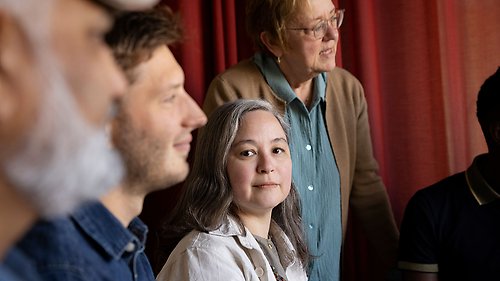About U-CARE

U-CARE is one of the Swedish government’s strategic research programmes established in 2010. We adopt a transdisciplinary approach with the overall goal to contribute to good and cost-effective psychosocial care for people with experience of physical illness and their loved ones.
We conduct novel healthcare research of excellent quality and significant relevancy, usefulness, and value for people with experience of physical illness, their loved ones, health and social care actors, and wider society. We are internationally renowned for our research on the development, test, evaluation, and implementation of complex healthcare interventions.
Within U-CARE, we conduct research to increase our understanding of how people with experience of physical illnesses, and their loved ones, are affected psychosocially and in their everyday life, and what support they need to improve their health and wellbeing. In addition, we develop complex healthcare interventions, such as self-help programmes, to increase access to psychosocial support for these individuals.
To improve access to psychosocial support, a main focus area is the development of e-Health interventions. To achieve this, we have developed and maintain the most advanced e-Health research platform in Sweden: The U-CARE Platform. It is designed to deliver e-Health interventions, such as web-based psychological interventions. It is also designed to support the execution of digital study procedures, for example, randomisation, web-based informed consent, and data collection.
Vision
Our overall goal is to contribute to good and cost-effective psychosocial care for people with experience of physical illness and their loved ones. When a person experiences a physical illness, both the person and those close to the person can experience psychological problems such as depression, anxiety, and post-traumatic stress. Today, unfortunately, only a small part of everyone who experience psychological problems in connection with a physical illness receives evidence-based support help to deal with their problems.
We at U-CARE want as many people as possible to get access to the support they need. Therefore, since 2010 we have been developing psychological support and self-help programmes for a number of different groups and groups of close ones, for example parents of children who have been treated for cancer and informal caregivers of people with dementia. We have also developed web-based psychological self-help programmes for adults with cancer and heart problems, as well as workbooks for people with dementia.
Our ambition is to improve the health and well-being for people with experience of physical illness, and their loved ones, while at the same time we strive to reduce costs for individuals and society.
We also have an ambition to improve the health and well-being for people with experience of physical illness, and their loved ones, who may experience healthcare inequalities related to factors such as gender, sex, migration status, and socioeconomic background. Therefore, we also focus on areas such as: Global Mental Health, Men’s Mental Health, and Migrant Health.
Goals
- To conduct innovative research of high international quality to understand both the psychological and economic consequences of physical illness, while developing, testing, and evaluating complex healthcare interventions, such as psychological self-help support.
- To enable the development, test, and evaluation of web-based psychological support and self-help programmes for external research groups through our research platform, the U-CARE Platform.
- To conduct high-quality education at various levels in the fields of Clinical Psychology, Global Health, Mental and Digital Health, Implementation Science and research methods.
- To promote that the psychological support and the programmes we develop should be introduced into regular health care.
Transdisciplinary approach
The co-production of knowledge across academic disciplines and with non-academic stakeholders is considered essential to our research success.
- We conduct research together with public contributors (for example people with lived experience of physical illness and their loved ones) to help us formulate important and relevant research questions, co-create acceptable study procedures and participant-facing material, co-analyse and interpret study findings, and co-disseminate our research activities. This approach is essential to increase the acceptability, relevance, and usefulness of the research we conduct, and interventions we develop, within U-CARE.
- We collaborate with non-profit community organisations and health and social care professionals to ensure our research is closely aligned with healthcare and societal needs.
- We collaborate with national and international academics across multiple disciplines, including: Clinical Psychology, Health Economics, Econometrics, Global Mental Health, Public Health, Healthcare Sciences, Health Services Research, Implementation Science, Nursing Sciences, Physiotherapy, Information Systems, Human-Machine Interaction, Health Information Technology, and Systems Architecture.
Research methodology
To achieve our vision and goals, we have significant methodological expertise integral to the development, testing, evaluation, and implementation of complex healthcare interventions, including:
- Public contribution in research
- Evidence synthesis
- Human-centered design
- Participatory action research
- Feasibility studies
- Randomised controlled trials
- Process evaluation
- Implementation science
- Mixed methods
Hosting research group
U-CARE is hosted by the research group Healthcare Sciences and e-Health. Healthcare Sciences and e-Health is a transdisciplinary research group, with an overall goal to develop complex healthcare interventions for people with experience of physical illness and their loved ones. One research focus reflects global shifts to integrated care systems, for example, the use of self-management and self-help programmes to help individuals become active co-creators in their own care. Our research recognizes the promise of e-Health to facilitate shifts to integrated models of care. Related areas of research focus include person-centred transition programs for young people with long-term conditions transitioning from pediatric to adult healthcare.
The research group Healthcare Sciences and e-Health is situated within the research unit Digital Health and Mental Health, which also includes the research groups Cardiovascular Psychology, PERCEPT and Participatory eHealth and Health data Research Group (PeHR). The overall aim of the research unit Digital Health and Mental Health is to conduct research at the forefront of scientific and technological developments within the digitalization of healthcare, especially in the field of mental health.


